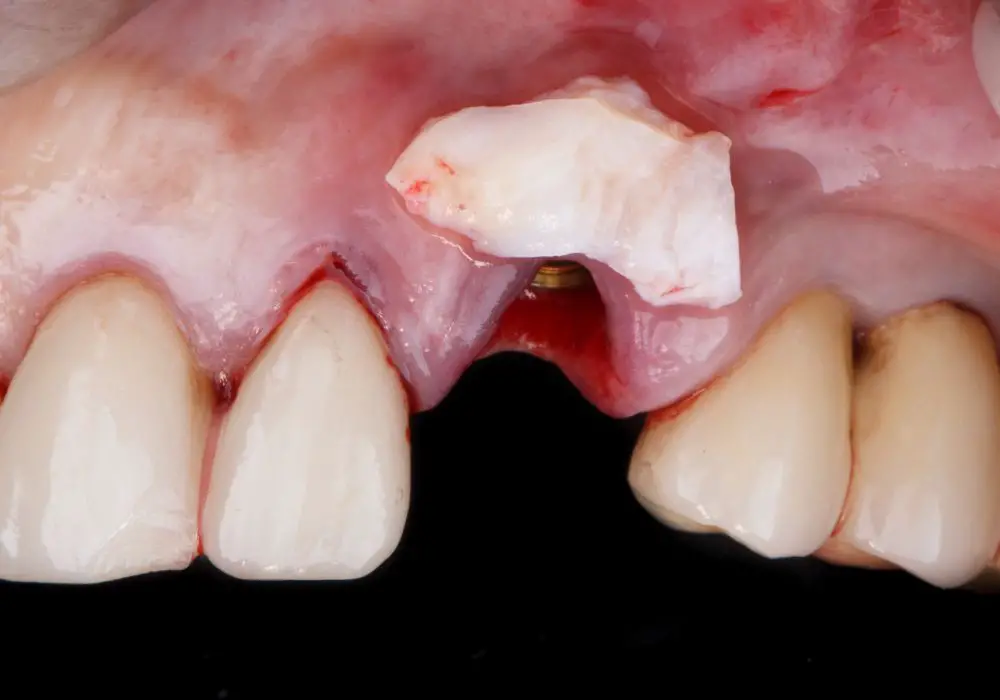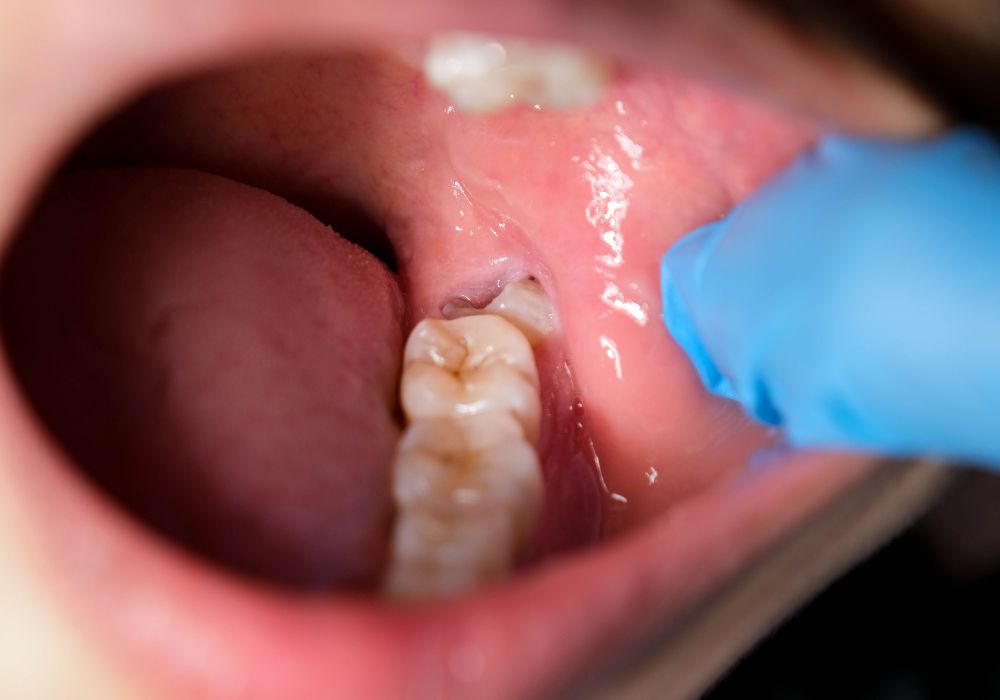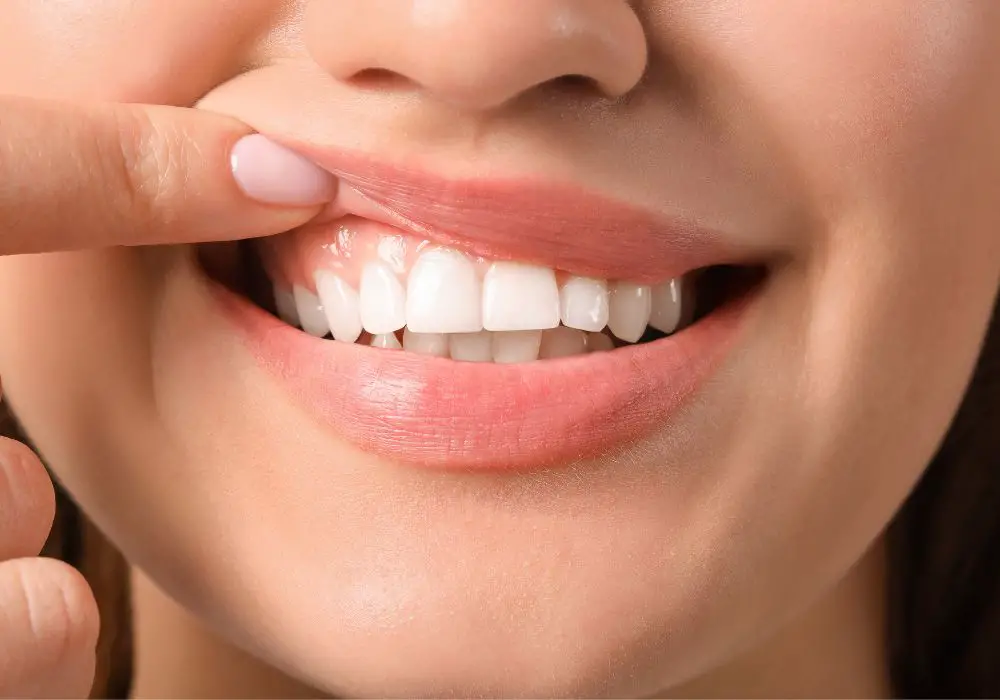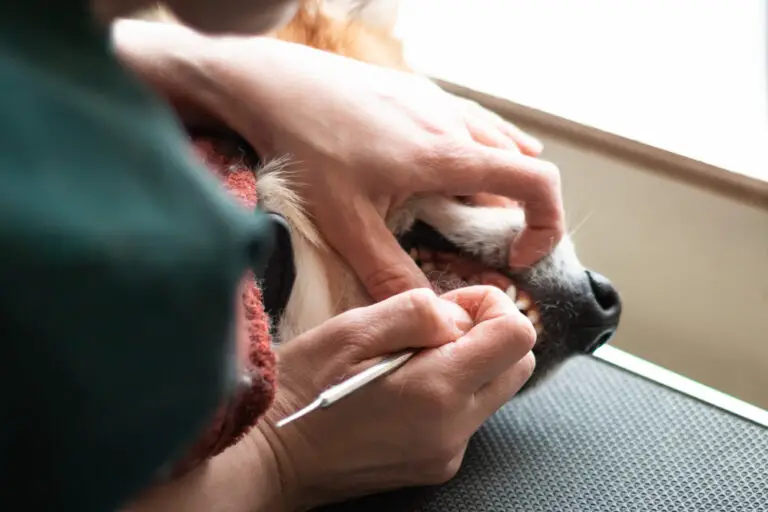Do gum flaps go away? This is a common question that many people have when they notice a flap of gum tissue over their wisdom tooth. Gum flaps, also known as opercula, can form when a wisdom tooth is partially erupted. While some gum flaps may go away on their own, others may require treatment to prevent infection and further complications.
If you have a gum flap over your wisdom tooth, it is important to keep the area clean to prevent bacteria buildup and infection. Brushing and flossing regularly can help remove food particles and debris that may be trapped under the flap. However, if the flap does not go away on its own or becomes infected, treatment may be necessary. This may include antibiotics, removal of the flap, or in some cases, extraction of the wisdom tooth.
It is important to consult with your dentist or oral surgeon if you have a gum flap over your wisdom tooth. They can assess the situation and recommend the best course of action to prevent further complications. While some gum flaps may go away on their own, it is always better to err on the side of caution and seek professional advice.
Understanding Gum Flaps
If you have been diagnosed with gum disease, your dentist or periodontist may recommend gum flap surgery. This procedure involves making small incisions in the gum tissue to access the roots of your teeth and remove any diseased tissue. But what exactly are gum flaps, and how do they develop?
Gum flaps are pockets of tissue that form around the base of your teeth, where they meet the gums. They can develop when bacteria in plaque and tartar build up on your teeth and irritate your gums. Over time, this can cause your gums to pull away from your teeth, creating small pockets where bacteria can thrive. If left untreated, these pockets can become deeper and more difficult to clean, leading to further gum damage and tooth loss.
Gum flap surgery is typically recommended for patients with advanced gum disease, where non-surgical treatments such as scaling and root planing have not been effective. During the procedure, your dentist or periodontist will use local anesthesia to numb the area and make small incisions in the gum tissue. They will then fold back the gum flap to access the roots of your teeth and remove any diseased tissue. Once the procedure is complete, the gum flap will be repositioned and sutured back into place.
While gum flap surgery can be an effective treatment for gum disease, it is important to note that it is not a cure. To prevent further gum damage and the development of new gum flaps, it is essential to practice good oral hygiene habits such as brushing twice a day, flossing daily, and visiting your dentist regularly for cleanings and checkups.
In summary, gum flaps are pockets of tissue that can develop around the base of your teeth due to gum disease. Gum flap surgery may be recommended for patients with advanced gum disease, but it is important to maintain good oral hygiene habits to prevent further damage.
Causes of Gum Flaps
If you have noticed a flap of gum tissue around your teeth, it is usually a sign of gum disease or poor oral hygiene. Here are some common causes of gum flaps:
- Brushing too hard: Brushing your teeth too hard or with a toothbrush that has hard bristles can damage your gums, causing them to recede and form a gum flap.
- Gum disease: Gum disease is a bacterial infection that can cause inflammation and damage to your gums, leading to the formation of gum flaps.
- Wisdom teeth: When your wisdom teeth start growing, they can push against your gums, causing them to form a flap.
- Trauma: Trauma to your mouth or teeth can cause your gums to recede and form a flap.
- Poor dental work: Poorly fitted fillings, crowns, or bridges can cause your gums to become inflamed and form a flap.
If left untreated, gum flaps can lead to more serious oral health problems, such as tooth decay, gum disease, and tooth loss. Therefore, it is important to seek treatment from a dental professional as soon as possible.
Do Gum Flaps Go Away Naturally

Gum flaps are a common dental issue that many people experience. A gum flap is a small piece of gum tissue that covers a part of a tooth. Gum flaps can be caused by a variety of factors, including wisdom teeth, gum disease, or injury. If you are experiencing a gum flap, you may be wondering if it will go away on its own.
Unfortunately, gum flaps do not typically go away on their own. In fact, they can become worse if left untreated. If you have a gum flap, it is important to see a dentist as soon as possible to determine the cause and appropriate treatment.
One common cause of gum flaps is wisdom teeth. When wisdom teeth are growing in, they can push against the surrounding gum tissue, causing a flap to form. In some cases, the flap may go away on its own once the wisdom teeth have fully erupted. However, if the flap is causing discomfort or is at risk of becoming infected, it may need to be removed by a dentist.
Gum disease is another common cause of gum flaps. When gum disease is present, the gums can become inflamed and pull away from the teeth, creating pockets where bacteria can thrive. Over time, these pockets can cause the gum tissue to break down, leading to the formation of gum flaps. If you have gum disease, it is important to seek treatment from a dentist to prevent further damage to your gums and teeth.
In some cases, a gum flap may be the result of injury to the mouth. If you have a gum flap that was caused by trauma, it may go away on its own as the surrounding tissue heals. However, if the flap is causing discomfort or is at risk of becoming infected, it is important to see a dentist to determine the best course of treatment.
In summary, gum flaps do not typically go away on their own. If you have a gum flap, it is important to see a dentist to determine the cause and appropriate treatment. Whether the flap is caused by wisdom teeth, gum disease, or injury, prompt treatment can help prevent further damage to your gums and teeth.
Medical Treatments for Gum Flaps
If you have gum flaps, there are several medical treatments available that can help you manage the condition. These treatments are designed to reduce inflammation, promote healing, and prevent further damage to your gums and teeth. Here are some of the most common medical treatments used for gum flaps:
Root Planing
Root planing is a non-surgical procedure that involves removing plaque and tartar from the roots of your teeth. This helps to smooth out the surface of your teeth, making it easier for your gums to reattach. During the procedure, your dentist will use special tools to remove the buildup of plaque and tartar from your teeth. This can be done under local anesthesia to minimize discomfort.
Gum Flap Surgery
Gum flap surgery is a more invasive treatment option that is used for more severe cases of gum flaps. During the procedure, your dentist will make small incisions in your gums to access the underlying tissue. They will then remove any damaged tissue and reposition your gums to cover the exposed roots of your teeth. This can help to reduce inflammation and promote healing.
Antibiotics
Antibiotics are often prescribed to help control bacterial infections that can cause gum flaps. They can be taken orally or applied topically to the affected area. Oral antibiotics are typically reserved for more severe cases of gum flaps, while topical antibiotics may be used for milder cases.
Laser Therapy
Laser therapy is a newer treatment option that uses a laser to remove damaged tissue and promote healing. The laser is able to penetrate deep into the gum tissue, killing bacteria and promoting the growth of healthy tissue. This treatment is typically less invasive than gum flap surgery and can be done under local anesthesia.
Overall, there are several medical treatments available for gum flaps. Your dentist will be able to recommend the best treatment option for your specific case. It is important to seek treatment as soon as possible to prevent further damage to your gums and teeth.
Home Remedies for Gum Flaps

If you are experiencing discomfort from a gum flap, there are a few home remedies you can try to alleviate the symptoms. Here are some options you can consider:
Salt Water Rinse
Salt water rinses are a simple and effective way to clean the area around the gum flap. Mix a teaspoon of salt into a cup of warm water and swish the solution around in your mouth for about 30 seconds. Spit out the solution and repeat several times a day. This can help reduce inflammation and prevent infection.
Hydrogen Peroxide
Hydrogen peroxide can also be used as a rinse to help clean the area around the gum flap. Mix equal parts of hydrogen peroxide and water and swish the solution around in your mouth for about 30 seconds. Spit out the solution and rinse your mouth with water. Repeat several times a day. Be careful not to swallow the solution, as it can be harmful if ingested.
Topical Ointments
There are also topical ointments that can be applied to the gum flap to help reduce inflammation and pain. Look for products that contain benzocaine or lidocaine, which are numbing agents that can provide temporary relief. You can also try applying a small amount of clove oil to the area, as it has natural anti-inflammatory properties.
Remember, these home remedies are not a substitute for professional dental care. If your symptoms persist or worsen, make an appointment with your dentist to get the proper treatment you need.
Preventing Gum Flaps
Gum flaps can be a painful and uncomfortable condition that can be prevented with proper oral hygiene and regular dental checkups. Here are some tips to help prevent gum flaps:
Oral Hygiene Practices
Maintaining good oral hygiene practices is one of the most effective ways to prevent gum flaps. Here are some tips:
- Brush your teeth at least twice a day with a fluoride toothpaste.
- Floss your teeth at least once a day to remove food particles and plaque from between your teeth.
- Use an antiseptic mouthwash to kill bacteria and freshen your breath.
- Use a soft-bristled toothbrush and brush your teeth gently to avoid damaging your gums.
- Avoid smoking or using tobacco products, which can irritate your gums and increase your risk of gum disease.
Regular Dental Checkups
Regular dental checkups are important for maintaining good oral health and preventing gum flaps. Here are some things to keep in mind:
- Visit your dentist at least twice a year for a routine checkup and cleaning.
- Talk to your dentist about any concerns you have with your gums or teeth.
- Follow your dentist’s recommendations for treatment of any gum disease or other oral health issues.
- Consider getting a professional dental cleaning to remove any built-up plaque or tartar from your teeth.
By following these tips, you can help prevent gum flaps and maintain good oral health. Remember to always consult with your dentist if you have any concerns about your gums or teeth.
When to Consult a Dentist?

If you have a gum flap over your wisdom tooth, you may wonder if it will go away on its own or if you need to see a dentist. While some gum flaps may resolve on their own, others require professional treatment to prevent further complications.
Here are some signs that you should consult a dentist:
- Pain or discomfort: If you experience pain or discomfort in the area around the gum flap, it could be a sign of infection or inflammation. A dentist can examine the area and determine the best course of treatment.
- Swelling or redness: Swelling or redness around the gum flap could indicate an infection. A dentist can prescribe antibiotics or perform a gum flap surgery to remove the infected tissue.
- Difficulty eating or speaking: If the gum flap interferes with your ability to eat or speak, it’s best to see a dentist. They can remove the flap or perform gum flap surgery to prevent further problems.
- Bad breath or taste in your mouth: A gum flap can trap food particles and bacteria, leading to bad breath or an unpleasant taste in your mouth. A dentist can clean the area and recommend oral hygiene practices to prevent further problems.
In general, it’s best to see a dentist if you have any concerns about your oral health. They can provide guidance on how to maintain healthy gums and teeth and prevent further complications.
Frequently Asked Questions
How long does it take for gum flaps to heal?
The healing time for gum flaps depends on the severity of the issue. Minor gum flaps may heal on their own within a few days or weeks, while more severe cases may require medical intervention. If you have a gum flap that is causing discomfort or pain, it’s best to seek professional help.
What causes gum flaps to form?
Gum flaps can form due to a variety of reasons, including poor oral hygiene, gum disease, injury to the gums, and wisdom tooth eruption. Gum flaps can also form due to hormonal changes during pregnancy or menopause.
Can gum flaps be treated at home?
While some minor gum flaps may heal on their own, it’s best to seek professional help for more severe cases. There are some home remedies that may help alleviate discomfort, such as rinsing with salt water or applying a cold compress to the affected area. However, these remedies should not be used as a substitute for professional treatment.
What are the risks of leaving gum flaps untreated?
Leaving gum flaps untreated can lead to further oral health issues, such as gum disease, tooth decay, and even tooth loss. It’s important to seek treatment as soon as possible to prevent these complications.
What is the recovery time after gum flap surgery?
The recovery time after gum flap surgery varies depending on the severity of the issue. In general, it takes around two to three weeks for the gums to fully heal after surgery. During this time, it’s important to follow the aftercare instructions provided by your dentist or oral surgeon.
How can I prevent gum flaps from forming in the future?
The best way to prevent gum flaps from forming is to maintain good oral hygiene habits, such as brushing twice a day, flossing daily, and visiting your dentist regularly for checkups and cleanings. Avoiding tobacco use and maintaining a healthy diet can also help prevent gum disease and other oral health issues.






